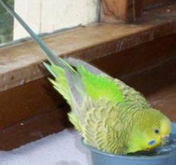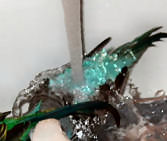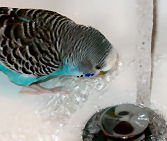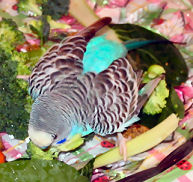Bird Care
Baths
Many of our pet birds are from a tropical climate where it rains daily, or it does quite often. The rain gives birds drinking water and gives them a chance to take a shower. Some birds even bathe in the puddles left by the rain. Showering or bathing keep the birds feathers healthy, giving them a shiny appearence. It will remove old feather, prevents dry skin, and promotes preening.
You should always make sure that when you give your bird a shower/bath that its a warm day and is about mid morning or early afternoon. That way, your bird will not become cold as the temperature comes down for the day. Always avoid any drafts after your bird has bathed because quick fluctuations in temps can make him sick.
Baths or showers should be given according to the bird. If your bird seems to enjoy taking a shower, you should definitely give him a spritzing. If the bird seems to be uncomfortable with a shower, then try giving him a bath instead. Just introduce the "bird bathtub" to your bird, and he may go for it. There are different types of " bird bathtubs" out there - there are ones with mirrors at the bottom, there are ones with bells attached, and there are plain ones. Experiment and see which one your bird prefers. Some birds prefer to take baths out of shallow dishes instead of bird bathtubs. If your bird decides he likes either the "bathtub" or bathing in a shallow dish, make sure that the water is shallow enough so that your bird can't drown (the types of birds that LFB concerns do not know how to swim!). The water should not be more than 1 - 2 inches high. Shallow tubs or dishes are ideal for very small birds such as finches and canaries.
 |
If you plan to shower your bird, then a misting sprayer bottle is one way to go. Use a mister that has never been used before. If there are any harmful substances previously in the bottle, it could hurt your bird even though you may have rinsed it out a number of times because it only takes small traces of the harmful substance to do significant damage. An alternative to misting is to take your bird into the shower with you. There are many commercialized shower perches available. They suction to the wall of the shower. Remember to never let the shower head spray directly on your bird. The water pressure may be to strong for him or the temperature of the water may change suddenly (possibly due to someone else in the household using a certain temperature of water - such as the flush of a toilet) and this my scald or make the bird sick.The temperature of the water should always be lukewarm. If it is anything cooler, your birds may become to cold, and become ill. Smaller birds (such as budgie, parrotlets, and lovebirds) should be given a shower directly under a running tap instead of under a shower head because the pressure is just too strong from most shower heads even if it is set to low.
 |
 |
Many people wonder how often a bird should bathe. This depends if your bird likes to bathe or not. Some birds like it well enough to bathe everyday (especially finches and canaries), and some just once a week. Just observe your bird and if he/she really enjoys the bath or shower, provide this everyday. If he doesn't like the bath every day, give it every other day and then maybe to once or twice a week.
If your bird is in the process of molting. Encourage your bird to bathe more often. The baths can help soothe the newly growing feathers (which tend to be very itchy), help clean out feathers, and discard dead skin cells.
If you notice that your bird's chest muscles appear to be shivering when s/he is bathing in a warm room with warm water and no draft, this is normal and nothing to be worried about. It is most likely a behavior exhibited by your bird to try to dry his feathers faster.
Not all birds like to bathe with just water, sometimes it takes a certain extra something to encourage him to dive in. If you notice that your bird likes to roll around in wet greens, try throwing some wet greens into a shallow dish or a bird tub. You never know what this could be. Just observe your bird and try to see if he likes some stuff wet, but not dry.
 |
If your bird is ill, do not bathe your bird. The bath could become hazardous to the birds health. This is because during times of illness, the bird's immune system is working its hardest to fight off the pathogen and does so most effectively by raising the body temperature (causing fever) since most pathogens do not like heat. If you give your bird a bath while he is sick, it will drop his body temperature and help the pathogen invade more efficiently. If the bird is sick, take the bird to the vet as soon as possible.
Always supervise your bird's baths. Some bizarre thing could happen and cause your bird to have trouble while bathing and if you're not there, you may come back to find the consequences of not watching him.
Most birds love baths. It promotes healthy feather, preening, and most of all it's fascinating to watch them. Make "bath time" a time where both you and your bird will enjoy.
